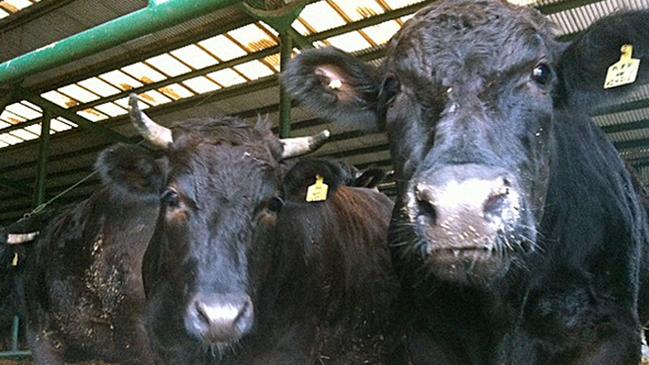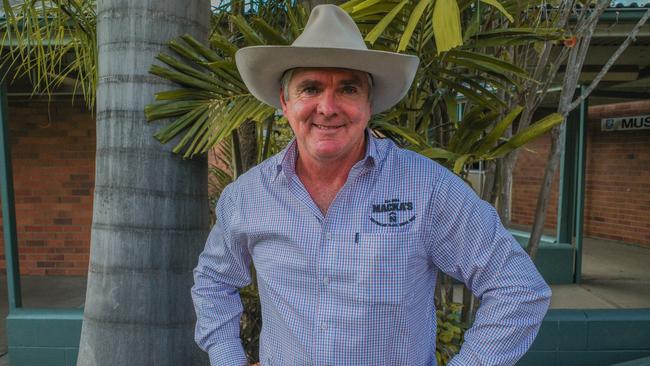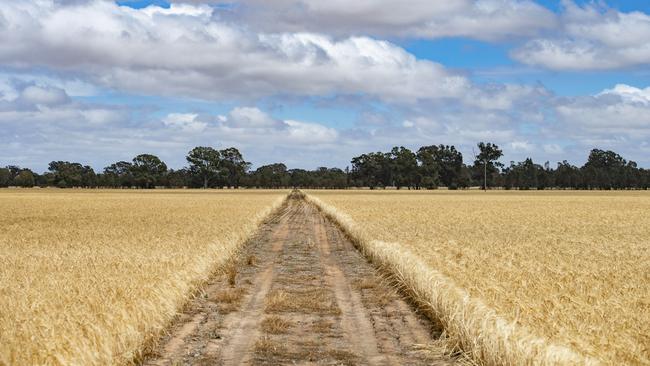Farmers cheer as China’s trade beef declines
Revelations that three Australian abattoirs have had their Chinese licences restored raises hopes the wine and lobster export industries could soon get some positive news.

Two weeks ago, NSW farmer Robert Mackenzie was hosting potential Chinese customers for his black Angus beef at his properties north of Newcastle.
Coming soon after the visit by Prime Minister Anthony Albanese to China in early November, the atmosphere on both sides was optimistic that the market for his Australian beef in China was reopening.
“In our discussions, we all felt that things are starting to get back to some normalcy,” he told The Australian after learning that three Australian abattoirs have had their licences to sell to China restored.
The two plants he used to sell his meat to upmarket restaurants of China before they were among 10 plants to be hit by bans in May 2020 – one in northern NSW and one in Queensland – have not got their licenses back, but he believes it is only a matter of time.
The conversation at his farm, during an overnight stay by the visitors from Shanghai, was buoyed by news of the prime ministerial visit – with both sides seeing that as a further sign that things were improving.
Tuesday’s news on the three abattoirs has raised hopes that the two big areas of trade sanctions outstanding – wine and lobsters – could also see some positive news.
Australia and China are currently in discussions over the future of tariffs of up to 200 per cent imposed on the previously lucrative wine trade, which was once worth more than $1bn, following a draft ruling from the World Trade Organisation.
The lobster industry is hoping the market could resume before the traditional Chinese New Year celebrations.
While this week’s move will be welcomed as another step forward in repairing trade relations, it is a reflection of Australia’s complex relationship with China that a solid trade in beef was continuing despite the bans on specific abattoirs.
Despite the sanctions on some $20bn of specific Australian exports, China has remained Australia’s largest trading partner throughout the political tensions, a two-way trade worth more than $200bn a year.

China imported almost 170,000 tonnes of beef from Australia from January to September this year – a rise of 26.5 per cent over the previous year, making Australia the third-largest source of beef imports to China.
China’s latest move on beef follows the lifting of tariffs on Australian barley in August this year.
Barley was one of the first Australian exports to be hit by trade sanctions from China in the wake of deteriorating political relations, with an anti-dumping inquiry launched in November 2018 turning into tariffs in May 2020 – the same time as Mackenzie and other farmers were hit by the abattoir bans.
Chinese imports of Australian barley have now resumed, with 314,000 tonnes of barley worth $139m sent to the country since duties were removed, according to China’s General Administration of Customs.
Australia’s barley exports to China, which were particularly popular with Chinese beer makers, had reached more than $916m in 2018-19.
This year has also seen the resumption of Australian coal exports to China. They were never formally banned but were the subject of non-tariff action, which had the same impact.
In other trade news this week, China’s General Administration on Customs announced that Australia and China have reached an agreement to facilitate customs clearance for commodities trading by certified operators with Authorised Economic Operator (AEO) status. The AEO is a program under the WTO designed to improve efficiency in trade.
The agreement, which will come into force this week, was described by the Shanghai-based director of the Australian Studies Centre at the East China Normal University, Chen Hong, as a move to streamline trade between the two countries.
Australia and China had originally signed the agreement in 2017 but its operation was delayed by deteriorating political ties.

The two moves this week are a sign that progress continues to be made in reducing trade friction between the two countries.
As the director of the Australia China Relations Institute at UTS in Sydney, James Laurenceson, noted, Tuesday’s beef move is particularly significant given the recent tensions between Australia and China in the East and South China seas.
“It suggests that the process of relationship stabilisation that has been under way is more resilient than some assumed,” he said.
It could indicate that China may be able to adopt a more nuanced approach, working through political issues and disputes as they arise, while continuing a strong trade relationship.
It is hard to know exactly what motivates Beijing, but as Laurenceson notes, apart from some specific areas, Australia’s export trade was not dealt a body blow by the Chinese sanctions of recent years.
While Beijing has clearly wanted a better relationship with Australia, and took the opportunity of a change of government last year to achieve it, it appears that there has been a broader recognition that “wolf warrior diplomacy” was not working on a global scale.
China’s economy is now the weakest it has been in many years as it struggles to recover from the harsh years of the Covid shutdown.
But despite its reopening, there has also been a greater wariness about further investment in China by Western companies.
European countries which were once enthusiastic traders and investors in China have become a lot more cautious in the wake of Beijing’s backing of Russian President Vladimir Putin.
Improving trade ties is a lot easier for Australia, which has not been a big investor in China.
Mackenzie’s good personal relationship with his potential customers in Shanghai (which follow earlier visits to his farms this year by potential buyers from other parts of China) is yet another example of the kind of personal business-to-business relationships between Australia and China which thrive once governments remove barriers.
Albanese’s visit to China coincided with China’s annual import Expo (CIIE), which saw a record 250 Australian companies exhibit their products at what must be the world’s largest trade show.
David Olsson, the president of the Australia China Business Council, says that there has been a “marked improvement in the atmospherics of the bilateral relationship, and some tangible developments” since Mr Albanese’s visit.
“Negotiations to resolve the issues around wine are under way and seem to be on track.
“Barley exports have resumed, and it’s great to see some of our abattoirs can now resume trade,” he said.
“We all hope that we’ll see Australian wine, lobsters and meat on Chinese plates in the early new year.”
“While businesses aren’t expecting that everything will be resolved immediately, it’s clear that the Prime Minister’s visit has helped to remove some of the uncertainty and restore confidence in China’s markets.”
Olsson says the past month has also seen a renewed enthusiasm on both sides for more people-to-people exchanges, including business delegations, students, tourism and cultural visits.
Australia’s trade and political ties with China will continue to be complex, with no guarantee that there won’t be more bumps in the road.
But for now, each step-by-step removal of trade barriers is being welcomed, hopefully paving the way for more business for exporters like Mackenzie.




To join the conversation, please log in. Don't have an account? Register
Join the conversation, you are commenting as Logout